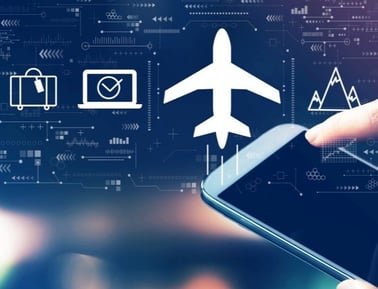According to IDC, global spending on AI in the travel and hospitality industry is expected to surpass $3.9 billion by 2026, driven largely by the growing need for hyper-personalization and operational efficiency.
Forrester’s research further reveals that 70% of travel and hospitality leaders are now actively investing in predictive analytics to enhance customer experience and drive revenue growth.
This surge is about reimagining the entire journey.
Since the world opened its doors post-pandemic, we’ve witnessed “revenge travel”- a tidal wave of travelers eager to make up for lost time. But what if hotels, airports, and airlines knew this was coming, proactively? What if they could anticipate guest needs before they were even expressed?
That’s where predictive AI is completely transforming the travel and hospitality experience.
The Dubai International Airport in June 2024 revealed a new AI-led initiative in their hi-tech airport – a Material Requirement Planning (MRP) tool that would essentially predict when the airport supply management operations will require inventory. Powered by AI and ML, the tool streamlined supply management, which in turn boosted operational efficiency.
The implementation of the MRP tool has resulted in a 30% increase in forecast accuracy, which enables meticulous inventory planning and a 12% reduction in surplus stock. Such optimization leads to better capital utilization and ensures that resources are accessible when necessary.
As the digital footprint continues to generate more data, the industry is expecting to experience several new facets of its application across the globe.
Predictive AI is Transforming Guest Experiences
When predictive AI-powered systems can anticipate that a business traveler typically requests a late checkout or that a family usually needs connecting rooms, these preferences can be addressed before they become pain points in the customer experience. By analyzing patterns in customer behavior, travel history, and preferences, hospitality providers can now forecast needs with remarkable accuracy.
Well-designed AI chatbot integration indicates that it can enhance guest satisfaction. Some implementations even reported satisfaction scores above 90% by providing instant, personalized responses. Consumers are likely to make purchases when offered personalized experiences. Hotels and airlines are leveraging AI to tailor their services accordingly. These systems analyze previous stays, dining preferences, and booking patterns to create truly individualized experiences
When flight delays occur, smart systems can automatically suggest alternative transportation and notify hotels of late arrivals. This seamless coordination creates a frictionless experience that strengthens brand loyalty.
Behind the Scenes: Operational Excellence
Back-end operations in travel and hospitality are also ripe for utilizing predictive AI, delivering efficiencies that translate directly to improved guest experiences and healthier bottom lines.
Dynamic pricing strategies have become increasingly sophisticated, adjusting rates in real-time based on demand patterns, competitor pricing, and even external factors like local events or weather conditions. McKinsey research indicates that these advanced analytics approaches can boost earnings by up to 25% in the travel sector. Quite a compelling reason for adoption across the industry.
Baggage handling systems have seen dramatic improvements through predictive technology. As reported in the Daily Telegraph, Singapore's Changi Airport has implemented AI-driven screening systems that significantly reduce wait times while maintaining security standards. These innovations enhance operational throughput during peak travel periods when efficiency matters most.
Resource allocation has become more precise through AI-powered scheduling tools that match staffing levels to predicted demand. This transformation is increasingly important as companies like prominent hotel chains implement automation to reduce administrative costs by $80-90 million while maintaining service standards despite significant staff reductions.
These behind-the-scenes applications of predictive AI are creating a more efficient, responsive travel ecosystem that benefits both providers and their guests.
Managing Travel Disruptions Proactively
Flight delay prediction has become remarkably sophisticated. AI systems are now analyzing everything from weather patterns to aircraft maintenance schedules to identify potential disruptions hours or even days in advance.
When disruptions do occur, alternative booking suggestions powered by AI can dramatically improve the customer experience. For instance, a prominent Australian airline has adopted a rebooking platform that predicts customer preference. It can evaluate thousands of rebooking options to find optimal alternatives that align with each traveler's original itinerary and preferences.
This automated approach ensures that affected passengers receive viable options within moments of a cancellation rather than facing long wait times with customer service.
Revenue Optimization Strategies
Revenue management is also receiving a boost from predictive AI being implemented across the travel and hospitality industry.
Smart pricing models have evolved beyond simple supply and demand calculations to incorporate hundreds of variables in real-time decision-making. These AI-powered systems analyze competitor rates, search patterns, booking velocities, and even social media sentiment to set optimal prices.
McKinsey research confirms the impact, showing that travel companies leverage these advanced analytics capabilities. As already mentioned, this can increase earnings by up to 25%, a substantial competitive advantage in an industry with traditionally thin margins.
Global Distribution System (GDS) integration has become more intelligent through predictive analytics, allowing hotels and airlines to optimize their presence across distribution channels. These systems now automatically adjust inventory allocation based on predicted booking patterns, ensuring maximum visibility when and where potential customers are most likely to book.
Fare management systems have similarly evolved, using predictive algorithms to create personalized pricing that reflects individual customer value rather than applying one-size-fits-all approaches. This level of customization increases conversion rates while protecting brand integrity and revenue targets.
Contact Center Innovation
Although contact centers are cost-intensive in industries like travel and hospitality, predictive AI can actually change their strategic positioning. The approach to customer care will now shift drastically from being reactive to a proactive one.
AI-powered agent assistance has become increasingly sophisticated, providing real-time guidance during customer interactions. These systems analyze customer tone, history, and query patterns to suggest optimal responses and solutions. Agents receive instant access to relevant information such as policy details, personalized offers and much more allowing them to resolve issues faster and more effectively.
Quality monitoring has evolved beyond simple call recording to comprehensive interaction analysis. AI systems now evaluate every customer touchpoint against established quality standards, identifying coaching opportunities and recognizing exceptional service. This continuous evaluation creates a feedback loop that drives ongoing improvement across the contact center.
Performance optimization through predictive analytics allows managers to forecast contact volumes with remarkable precision, ensuring appropriate staffing levels even during unexpected demand spikes. These systems also identify process inefficiencies and bottlenecks before they impact customer experience.
Future Trends and Opportunities
Predictive AI in travel and hospitality continues to accelerate, with emerging technologies promising even greater transformation in the years ahead. These innovations will reshape how companies anticipate customer needs, maintain infrastructure, and deliver personalized experiences across global markets.
Advanced demand forecasting: This technology is becoming increasingly sophisticated through the integration of non-traditional data sources. These enhanced forecasting capabilities allow businesses to anticipate market shifts with unprecedented accuracy, optimizing inventory and pricing strategies months in advance.
Autonomous decision-making systems: This is acting as the next frontier, moving beyond simple predictions to implement real-time adjustments without human intervention. These systems continuously analyze performance metrics, customer feedback, and competitive dynamics to optimize everything from room pricing to flight scheduling.
Predictive maintenance: Research from December 2024 discussed how microservice-based frameworks for predictive analytics in travel reservation systems can identify potential failures before they impact service delivery. Such a proactive approach significantly reduces downtime while extending equipment lifespan and controlling maintenance costs.
These emerging technologies collectively point toward a future where travel experiences become more seamless, personalized, and reliable through the intelligent application of predictive AI.
Inference
Predictive AI has several applications that travel, and hospitality continues to reshape how companies anticipate customer needs, maintain infrastructure, and deliver personalized experiences across global markets.
Industry leaders need to embrace predictive technologies to gain a competitive edge. Customer acquisition, operations, and customer service processes are all expecting a renovation that has been long awaited.
C-suite leaders integrating technology such as predictive AI efficiently are at a high probability of being industry pioneers. The idea is to reinforce organizational resources with technology to create more meaningful, efficient, and delightful travel experiences that connect people across the globe.
Related reads.


About Coforge.
We are a global digital services and solutions provider, who leverage emerging technologies and deep domain expertise to deliver real-world business impact for our clients. A focus on very select industries, a detailed understanding of the underlying processes of those industries, and partnerships with leading platforms provide us with a distinct perspective. We lead with our product engineering approach and leverage Cloud, Data, Integration, and Automation technologies to transform client businesses into intelligent, high-growth enterprises. Our proprietary platforms power critical business processes across our core verticals. We are located in 23 countries with 30 delivery centers across nine countries.


